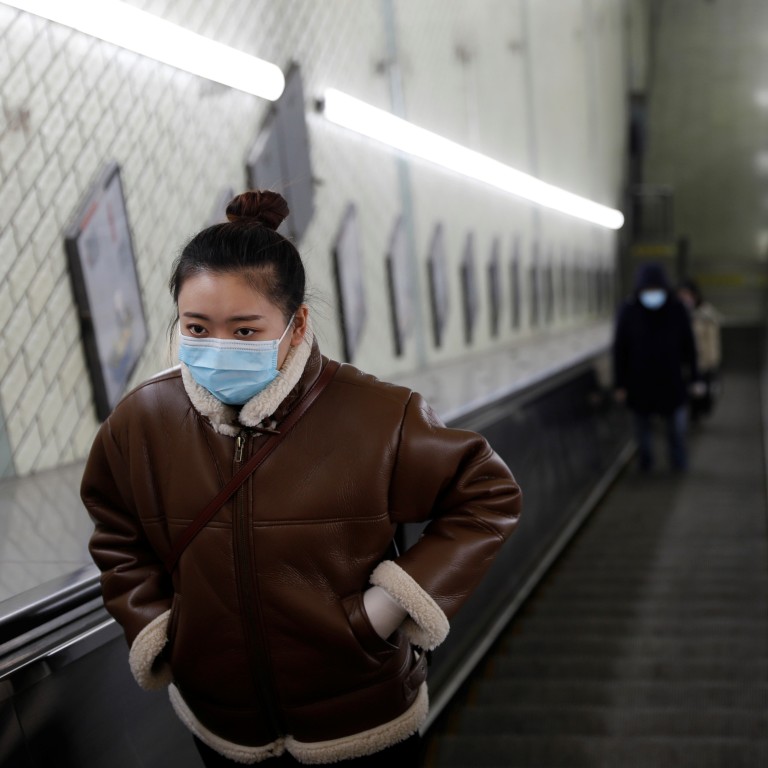
Beijing and Shanghai impose new controls on residents as China battles to contain coronavirus
- Capital and financial centre, with combined population of over 44 million, join dozens of other cities in partial lockdown in bid to curtail spread of virus
- Mask-wearing in public made compulsory and curbs on movement of people and vehicles introduced in Beijing
China’s two biggest cities have announced fresh restrictions on residential communities to prevent the spread of the deadly new coronavirus, joining dozens of mainland cities that have gone into partial lockdown since the epidemic began last month.
Measures unveiled by the authorities in Beijing and Shanghai on Monday include stricter controls on the movement of residents and vehicles, compulsory mask-wearing and shutting down leisure and other non-essential community services.
The lockdown-style measures appear to be aimed at controlling possible community transmission of the virus as the country returns to work at the end of an extended Lunar New Year holiday.
Last week, megacities such as Guangzhou, Shenzhen, Tianjin, Hangzhou and Chengdu announced similar restrictions. In addition to Hubei, authorities in Liaoning and Jiangxi provinces have also imposed provincewide measures.
Partial lockdown measures are already in place in more than 80 cities in nearly 20 provinces and municipalities since the central government imposed a lockdown in Wuhan, the epicentre of the outbreak, and its neighbouring cities on January 23.
Beijing Daily reported on Monday that the capital, with a population of over 20 million, would step up efforts to further restrict access to residential communities and compounds and introduce a citywide registration system for entries into Beijing.
Anyone who has been to Hubei or other outbreak hotspots in the past 14 days will have to stay at home while those who have been in close contact with a coronavirus patient will be quarantined.
Cultural and recreational facilities will be closed while couriers and other delivery services will have limited access to housing estates and compounds.
Officials at the epidemic control and prevention centre in Shanghai said on Monday that “the vast majority” of the city’s 13,000 residential communities and compounds had instituted “lockdown management”, including entry restrictions and mandatory temperature checks.
They said residential communities across Shanghai, a city of 24 million and the country’s financial centre, should also offer English signs and other help to expatriates so that they may also comply with the entry control requirements.
The measures unveiled in Beijing and Shanghai were unprecedented. They came as the number of new deaths over the past 24 hours reached 97, its highest in China in a single day so far.
Coronavirus: mother of whistle-blower Li Wenliang demands answers
The death toll from the new coronavirus epidemic has already surpassed that of severe acute respiratory syndrome in 2003, having killed more than 900 people, mostly in Hubei province.
Beijing has reported 337 confirmed cases and two deaths so far, including 11 new cases as of Sunday.
Shanghai reported seven new confirmed cases also by Sunday, with the total number of confirmed cases standing at 299.
Most residents appear supportive of the restrictions amid widespread anxiety and fear over the spread of the deadly virus.
“The lockdown is necessary because it could reduce unnecessary contacts with people from outside and keep the compound hygienic,” said Tang Liyuan, a 63-year-old resident in Beijing’s Chaoyang district.
But she said that, with restrictions in place for the past two weeks, it felt like “living in a prison”.
Zhang Chaoqun, a 40-year-old resident in Changping district in Beijing, said that since people are afraid of going out, the new measures may make little difference. “I hope the period of lockdown will not last long because I want my normal life back,” he said.
But many others, who were apparently dissatisfied with the government’s handling of the coronavirus outbreak and the disruption to their lives, complained about the sweeping restrictions and questioned their effectiveness.
Escaping Wuhan: Chinese-American on her evacuation from coronavirus-hit city
“What’s the point of such lockdown measures if we are still required to go back to the office to resume work, where we are vulnerable to infections and human transmissions,” a Weibo user commented on the social media site.
A tenant in Shijiazhuang, the capital city of Hebei province neighbouring Beijing, said that he was told by his landlord that he needed to submit a medical document for a pass to enter his compound.
“But the problem is, I have to go to the hospital to get such document, but who wants to go to hospital at this moment?”
Additional reporting by Laura Zhou

